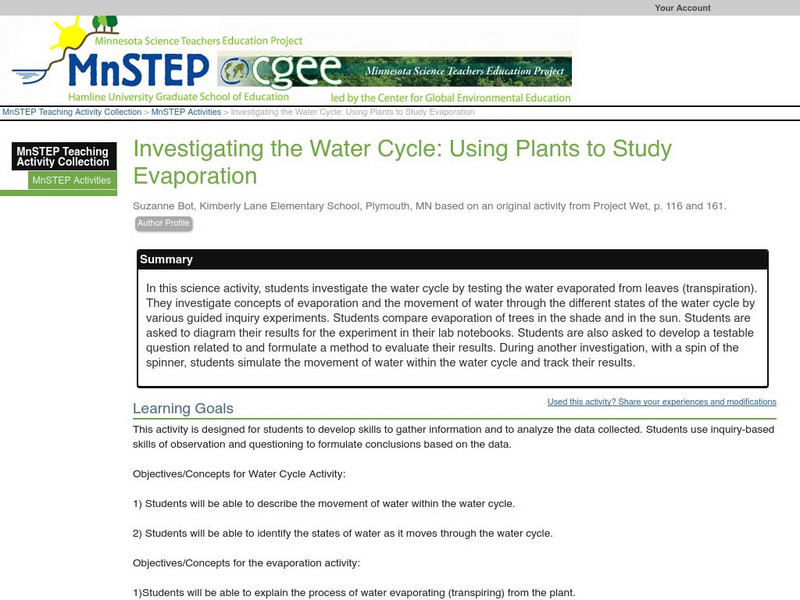Hi, what do you want to do?
Learning Games Lab
Fertilizing Chile
Fertilizer can mean the difference between a profit and a loss. Scholars use an online interactive to explore the effects of fertilizing in agriculture. Given information about the nitrogen levels in the soil, they decide the fertilizer...
Virginia Department of Education
Go with the Flow
How does nature's hierarchy relate to our local human environment? Answer this question, along with others, as the class visually depicts the natural hierarchy provided by nature. Pupils discuss each piece of the pyramid and its energy...
Curated OER
Sink or Float
Using a variety of objects, learners conduct buoyancy experiments. They make predictions on which object will sink or float and test their predictions. They use a graphic organizer to record their findings.
Curated OER
Dissolved Oxygen and Temperature
Young scholars are shown how temperature affects dissolved oxygen and they create a graph showing this relationship. They think about the adaptations of animals to live in different water temperatures. Students test four different water...
Curated OER
WaterWeb 2
For this water worksheet, students answer 10 questions about Florida's water. Students also describe the role of ground water and sinkholes.
Curated OER
Volcanoes: Fourth Grade Lesson Plans and Activities
Young geologists begin exploring volcanoes of different structures and states: active, extinct, or dormant. During the lab, they make three models and compare different types of volcanoes, including composite, cinder cone, and...
Curated OER
Biosphere
There is so much to learn about the different cycles, processes, and parts of the biosphere. Using a pretest as a formative assessment to see what your budding ecologists already know is a great way to figure out which important areas...
Curated OER
Going, Going, Gone!
Sixth graders use the scientific method to test variables of evaporation. In this evaporation lesson plan, 6th graders test a wet handprint on a paper towel and relate this experiment to weather conditions.
Curated OER
Dirty Decomposers
Students explore the ecosystem by conducting a ziploc bag experiment. In this recycling lesson, students identify decomposer organisms in our environment and how they speed up the recycling process. Students utilize a ziploc plastic bag,...
Curated OER
The Miracle Fish: Learning to Design an Experiment
Students develop procedures to explore the behavior of fish. In this scientific experiment lesson students from a hypothesis, write a question, identify different variables and controls in their experiment.
Curated OER
Photosynthesis: Intake of Carbon Dioxide - Production of Oxygen
High schoolers, after a long-term observation of photosynthesis with aquatic plants, assess the benefits of photosynthesis towards all living organisms. They explain in their own words the two cycles within photosynthesis. Guided...
Curated OER
Sand Dollars- Non-Fiction Comprehension Worksheet
In this sand dollar non-fiction reading comprehension worksheet, 5th graders read a 2 page selection about the life cycle and habitat of sand dollars. They use a dictionary and the article to define 10 words, and write the answer to 7...
Curated OER
What Do Plants Need?
Young scholars experiment with plants. In this plant lesson, students research the needs of plants. Young scholars determine if all plants have the same requirements for growth. In small groups, students experiment with different...
Curated OER
Examining Infiltration Rates of Various Soil Types
Students formulate their own hypothesis, determine which variables are important to test their hypothesis, design an experiment in which they collect data. They utilize instruments and tools to measure, calculate, and organize data.
Virginia Department of Education
Weather Patterns and Seasonal Changes
Get your class outside to observe their surroundings with a lesson highlighting weather patterns and seasonal changes. First, learners take a weather walk to survey how the weather affects animals, people, plants, and trees during...
Curated OER
Rocks and Soil
Middle schoolers explore the physical properties of rocks. They explore the three different types of rocks and are able to compare and contrast their different properties. Students simulate the creation of sedimentary rock, they also...
Curated OER
Weather and Oceans: Uneven Heating of the Earth
Students investigate what causes the heat on Earth. In this Earth heating lesson plan, students experiment with different heat sources and determine where the Earth gathers the most heat. Students explore vocabulary words...
Curated OER
Magnetic Discovery Bottle
Students examine how to conduct simple investigations and use simple equipment to gather data. In this magnet instructional activity students decide what types of objects are attracted to magnets.
Curated OER
Measurement: When Degrees Matter
Eighth graders record the temperature change of the beakers. In this general science lesson, 8th graders create their own data table for recording observations. They discuss experimental results and cite real life applications.
Curated OER
The Portable Niche
Third graders, in groups, research animals, plants, and conditions found in ecosystems.
Science Education Resource Center at Carleton College
Serc: Investigating the Water Cycle: Using Plants to Study Evaporation
In this science activity, students investigate the water cycle by testing the water evaporated from leaves (transpiration). They investigate concepts of evaporation and the movement of water through the different states of the water...

























